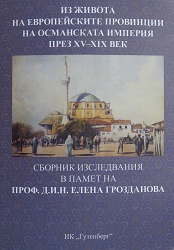
Ролята на поетично-музикалната традиция с религиозно-мистичен характер за съхраняването и изявата на алевийско-бекташийската култура в Лудогорието
In mankind history all nations had discovered a variety of forms for manifestation of their outlooks and religious beliefs, for the preservation of the created by them culture and maintaining of their cultural memory. Heralds of the cultural and historical memory of every nation and tradition community are the created by them poetic stringed instrument are an important aspect of the religious customs of the Alevi-Bektashi community in Bulgaria, in the regions where it is localized. Apart from being a part of the religious custom, this has been transformed in a form of manifestation of this community and preservation of its identity. Verses with mystical-religious content, called nefesi, divans, ilahi, and performed with an accompaniment of a stringed musical instrument (saz) of their religious and domestic ceremonies, they reflect to the greatest extent the religious doctrine, beliefs, outlook and ethical system of this community; are an important source of the exploration of its history, religious and social tradition, of the specific character of the followed interpretation of the Islam. For ages, these verses have been handed over in a verbal manner and recorded by the adepts of that community. Among the most performed with an accompaniment of saz by the Alevi-Bektashi in the Ludogorie region are the nefesi of the most popularrepresentatives of that tradition - Pir Sultan Abdal, Shah Khatai, Kul Himmet, Kul Himmet Ustazim, Kul Hatmim, Kul Huseyin and etc. Rewritten and read are verses of Yunus Emre as well, his followers, using the same pseudonyms, and etc. Here were born, too, local creators of the mystic-religious verses in the casual style and music to them that Alevi-Bektashi perform, the most ardent of which is Muhyddin Abdal. Among the authors of nefesi, recorded by the Alevi-Bektashi in the Ludogorie region are also Abdal Musa, Kaygusuz, Shemsi Boba and etc. The performance of nefesi and ilahi at the meetings of the Alevi-Bektashi community in the Ludogorie region, for ages has played a social part, too, and it has a uniting function between the members of the jam. The moving and deep suggestions, expressed with these verses, inspire deem emotional awareness on the audience. They appear priceless heralds of the culture of the community. The article discusses some issues, uncovering that aspect of the Alevi-Bektashi culture in the Ludogorie region, for example, the place of the jam in the preservation of the poetic-musical memmory; the authors, whose nefesi were recorded by its adepts; the subjects covered by the nefesi. The connection of that tradition with the music was emphasized as well and it was closely connected with the music tradition of the Turk Central Asia, and on the role of the zakir for the handing over of the tradition to the generations. It was asserted, too, that these verses were a universal system of values, which the Alevi-Bektashi had been following for ages.
More...